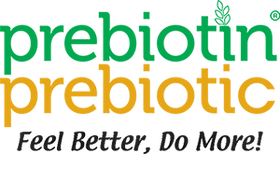One Easy Step – Lose Weight with Prebiotin

Are you ready for a simple addition to your weight management that has proven results? Prebiotin WM (Weight Management) can become the perfect addition to every diet, weight loss plan, or obesity treatment program.
To get the full benefit of Prebiotin WM, it is important to understand exactly how it fits into your overall digestive health.
Can Bacteria Really Determine My Weight?
A remarkable finding of modern science is that the trillions of bacteria in our digestive system, called the gut microbiome, act like a health organ. Among these trillions, there are at least 5,000 distinct bacterial strains.
Since we have as many bacteria as human cells in the body, with many concentrated in the colon, this abundance of bacteria has a major impact on our health and wellbeing. The right bacteria mix reduces our risk for disease, while an unhealthy mix has been linked to a wide range of health conditions, from obesity, heart disease, and cancer, to depression and even symptoms of schizophrenia.
From Dysbiosis to Obesity
In recent years, we have learned that most overweight people have an unhealthy mix of colon bacteria; this imbalance is called dysbiosis. Specifically, researchers found that in obese individuals there are more Firmicutes and less Bacteroidetes, two common types of bacteria, than in lean individuals.

What causes this type of unhealthy bacterial mix to occur? A diet, high in meat, saturated fat, processed food, and sweets, is associated with dysbiosis, as is frequent use of antibiotics and other specific medications, exposure to environmental toxins, poor dental hygiene, and constant stress.
As bad bacteria flourish, they can weaken the gut wall (“leaky gut syndrome”). This allows toxins to seep into the blood stream, reach the liver and eventually our circulatory system.
These toxins can lead to chronic inflammation throughout the body and contribute to high blood pressure, heart disease, poor blood sugar regulation, and weight gain, among many other health conditions.
What can I do to control weight gain?
Feed the beneficial bacteria in your gut microbiome! Most of us already know the benefits of a healthy vegetable and fruit-based diet and regular exercise to improve gut health and reduce stress. Prebiotin® Prebiotic Fiber, comprised of natural plant fibers oligofructose and inulin, has been part of numerous research studies that demonstrate how taking Prebiotin can also help to regulate the gut’s bacterial mix, resulting in a healthier colon.
Here is just a sample of the research that demonstrates the power of using Prebiotin to control your weight:
- Children gain less weight. In a 2017 study with 42 healthy, but obese or overweight children, ages 7-12, found that the microbiota of children who received inulin-based prebiotic fiber (the same ingredient as in Prebiotin) had beneficial changes in the intestinal microbiota and gained less weight.
The results projected over a year showed children who received the prebiotic fiber gained weight in the healthy range, while the group who did not receive the prebiotic fiber had triple the expected yearly weight increase, an extraordinary finding since childhood obesity is a serious problem in the United States and puts children and adolescents at risk for poor health.
The Growing Obesity Rates in Children
According to the CDC, nearly 19% of children aged 2-19 are obese. (Obesity affects about 13.7 million children and adolescents in the U.S.) In a 1971-1974 survey of the same age groups, obesity rates ranged from 4 to 6.1%, depending on the age group.
- Increase of beneficial bacteria. In a study with 30 obese women, researchers found that taking prebiotic fiber caused positive changes in the gut microbiome, including increased levels of two beneficial bacteria that are associated with decrease in fat mass and decreased risk of diabetes.
- Prediabetic individuals continue losing weight with inulin. Forty-four prediabetic individuals received either 18 weeks of inulin or cellulose supplementation. All had four visits to a dietitian to support a 5% weight loss, which they all achieved by week 9. The inulin group lost significantly more weight between 9 and 18 weeks and scored better on liver and lipid profiles, independent of weight loss.
- Fermentable fiber inulin prevents high-fat diet-induced metabolic syndrome. In a 2017 study with mice, researchers found that the fermentable fiber inulin prevented high-fat diet (HFD)-induced metabolic syndrome (a cluster of conditions—increased blood pressure, high blood sugar, excess body fat around the waist, and abnormal cholesterol or triglyceride levels—that occur together, increasing your risk of heart disease, stroke and diabetes) and colon atrophy. Inulin restored the depleted microbiota and strengthened the colon.
Prebiotic Fiber Health Benefits
Following are just a few ways you can benefit from supplementing with Prebiotin WM if you are trying to manage weight:
- Prebiotic fiber can reduce appetite by decreasing the amount of hunger hormone produced in the gut. As a result, you feel less hungry.
- There are satiety (or fullness) hormones produced in the wall of the small intestine. Prebiotics increase the release of these hormones to give you an earlier sense of fullness when you eat.
- Prebiotic fiber can help correct leaky gut. Research studies show that the prebiotic fiber in Prebiotin WM nourishes beneficial bacteria, which helps to reduce inflammation leading to leaky gut syndrome. With daily supplementation, Prebiotin WM can help to strengthen the gut blood barrier so toxins from the digestive process don’t leak into the blood stream, cause inflammation, and increase disease risk.
- Blood sugar control is better, with less insulin resistance.
- Inflammation in the gut and body is reduced.
Societal Impact of Obesity
Obesity is adding $190 billion annually to the price of healthcare in the U.S. (according to “The Economic Cost of an Obese Society,” Investopedia).
- Diabetes accounts for a majority of healthcare costs since about 85% of individuals with diabetes are overweight, and 30% of overweight people have the disease.
- Obese men accumulate an additional $1,152 a year in medical spending, while obese women account for an extra $3,615 per year.
- Childhood obesity alone costs $14.1 billion a year, with average health expenses costing over $6,000 per obese child.
- Obesity is also associated with lower productivity due to an increase in sick days and claims, averaging $506 per worker.
Why choose Prebiotin WM?
Prebiotin WM (Weight Management) contains both oligofructose and inulin (called OEI) derived 100% from chicory root, one of the richest sources of prebiotic fiber. Prebiotin WM is formulated to nurture and support the growth of beneficial bacteria in the whole colon.
Increases in bacteria like bifidobacteria and lactobacilli produce the highly desirable short chain fatty acids (SCFA). Higher levels of butyrate, a commonly noted SCFA, have been linked to the reduction of inflammation that is the start of so many of our health conditions, from obesity to arthritis.
Prebiotin supplementation has been shown to increase serum (blood) butyrate levels in as quickly as two weeks.
Fiber Content of Food
Should you want to learn how much fiber, both insoluble and soluble, you are eating each day, go to our Fiber Content of Food section and find out for yourself.
Part of Your Own Diet Plan

Weight loss and management must be a complete package. Changing the bacterial makeup of the colon will add a significant impact to the food program you are following. The program you choose should be one that makes sense for you and your own situation.
Your own personal dietary program could be prescribed by a hospital, doctor’s office, or it could be a widely recognized diet like the Mediterranean diet, or an established corporate weight loss program like Weight Watchers or NutriSystem.
Whichever diet you follow, it will be significantly more effective when your own microbiome, the bacterial makeup within your gut, works with you to support the eating choices you make.
Suggested 4 Week Prebiotin Program for Weight Management

Week 1: ½ scoop or 1 packet (2 grams) once a day.
Week 2: ½ scoop or 1 packet (2 grams) in the morning, ½ scoop or 1 packet (2 grams) in the mid-afternoon.
Week 3: 1 level scoop or 2 packets in the morning. ½ scoop or 1 packet (2 grams) in the mid-afternoon.
Week 4: 1 level scoop or 2 packets in the morning. 1 scoop or 2 packets in the midafternoon.
Thereafter, adjust the dosage to your own response. Remember, you cannot seriously overdose. In general, you can never get too much fiber. If mild bloating or gas should occur, simply wait a day and proceed with a reduced dose. Prebiotin WM will tend to encourage acidity within the colon. This is very healthy.
Many of us are looking to manage excess weight. Adding Prebiotin WM to a program that fits your lifestyle is an easy step that can help you maintain your weight while you get the many health benefits from adding more fiber to your diet.
For more information about Prebiotin and weight management and obesity, please take a look at our blog: Gut Microbiota and Obesity-Induced Inflammation: Men’s Health Month Edition
References
- Bourassa MW, Alim I, Bultman SJ, et al. Butyrate, neuroepigenetics and the gut microbiome: Can a high fiber diet improve brain health? Neuroscience Letters. 2015 June 20; 625: 56-63.
- Chassaing B, Raja SM, Lewis JD, et al. Colonic Microbiota Encroachment Correlates With Dysglycemia in Humans. Cellular and Molecular Gastroenterology and Hepatology. September 2017. 4(2):205-221.
- Childhood Obesity Facts: Prevalence of Childhood Obesity in the United States. CDC. Updated August 13, 2018. Accessed Feb 22, 2019.
- Courage KM. Fiber-Famished Gut Microbes Linked to Poor Health. Scientific American. March 23, 2015. Accessed Feb 21, 2019.
- Dewulf EM, Cani PD, Claus SP, et al. Insight into the prebiotic concept: lessons from an exploratory, double blind intervention study with inulin-type fructans in obese women. Gut. 2013 Aug; 62(8): 1112–1121. Published online 2012 Nov 7.
- Godman, Heidi. Adopt a Mediterranean diet now for better health later. Harvard Health Letter. Posted November 06, 2013. Accessed March 5, 2019.
- Guess ND, Dornhorst A, Oliver N, et al. A randomized controlled trial: the effect of inulin on weight management and ectopic fat in subjects with prediabetes. Nutr Metab (Lond). 2015 Oct 24;12:36. doi: 10.1186/s12986-015-0033-2. eCollection 2015.
- Harvard Men’s Health Watch. Can gut bacteria improve your health? Initial research suggests certain bacteria in your gut can prevent and treat many common diseases. Harvard Health Publishing. October 2016. Accessed March 2, 2019.
- Iannelli V. Know the Facts About Childhood Obesity. Very Well Health. Updated January 29, 2018. Accessed Feb 22, 2019.
- Koliada A, Syenko G, Moseiko V, et al. Association between body mass index and Firmicutes/Bacteroidetes ratio in an adult Ukrainian population. BMC Microbiol. 2017 May 22;17(1):120. doi: 10.1186/s12866-017-1027-1.
- Metabolic Syndrome. Mayo Clinic. Updated March 6, 2018. Accessed March3, 2019.
- Nath, Trevir. The Economic Cost Of An Obese Society. Investopedia. Updated Apr 17, 2015. Accessed 3-2-19.
- Nicoloucci AC, Hume MP, Martínez I, et al. (September 2017). Prebiotics Reduce Body Fat and Alter Intestinal Microbiota in Children Who Are Overweight or With Obesity. Gastroenterology, 153(3):711–722.
- Powell, Alvin. Obesity, Diabetes? We’ve Been Set Up. The Harvard Gazette. March 7, 2012. Accessed March 3, 2019.
- Sender R, Fuchs S, Milo R. Revised Estimates for the Number of Human and Bacteria Cells in the Body. PLoS Biol. 2016 Aug; 14(8): e1002533. Published online 2016 Aug 19.
- Tan J, McKenzie C, Potamitis M, et al. The role of short-chain fatty acids in health and disease. Adv Immunol. 2014;121:91-119. doi: 10.1016/B978-0-12-800100-4.00003-9.
- What Is Gut Dysbiosis and How Is It Caused? The Good Gut. Accessed March 1, 2019.
- Zou J, Chassaing B, Singh V, et al. Fiber-Mediated Nourishment of Gut Microbiota Protects against Diet-Induced Obesity by Restoring IL-22-Mediated Colonic Health. Cell Host & Microbe. Jan. 10, 2018. 23(1): 41-53.






